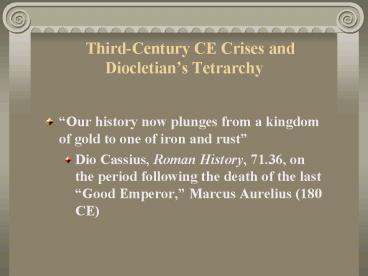ThirdCentury CE Crises and Diocletians Tetrarchy PowerPoint PPT Presentation
1 / 20
Title: ThirdCentury CE Crises and Diocletians Tetrarchy
1
Third-Century CE Crises and Diocletians
Tetrarchy
- Our history now plunges from a kingdom of gold
to one of iron and rust - Dio Cassius, Roman History, 71.36, on the period
following the death of the last Good Emperor,
Marcus Aurelius (180 CE)
2
Rust Internal Crises
- A Military Society
- Brutalization of the Civilian Population by the
Soldiery - Increasing Barbarization of the Army one of
Gibbons prime causal factors for the Decline
and Fall of the Roman Empire - Escalating Soldiers Pay and Donatives (Dio
Cassius, 74.11) - Soldier-Emperors (26 from 235-284 CE)
3
Increasing Burdens on the Landed Aristocracy
- Demands of Service on Local Councils
- Curiales, or local aristocracies, slowly becoming
hereditary castes - Impoverishment of curiales through public
benefaction - Disappearance of spontaneous euergetism
- Roman Senate evolving into a town council
4
Polarization Honestiores and Humiliores
- Local Protection (but this is a matter of degree,
as Roman society had always been a self-help
society) - Origins of Medieval Feudal Society in Europe
(Colonate)? - Constitutio Antoniniana (212 CE) Blanket Grant
of Roman Citizenship to Virtually All Free
Inhabitants in the Empire
5
Depopulation of Towns and Rural Areas
- Aquileia was in even earlier times a very big
city with a large population of its
own.consisting not only of citizens but also of
foreigners and merchants. At this time ca. 238
CE, however, the population was even further
increased by all the crowds streaming in from the
countryside, leaving the neighboring towns and
villages to seek safety inside the great city and
its surrounding wall. The ancient wall had been
for the most part demolished earlier, since after
the advent of Roman rule the cities of Italy no
longer needed walls or weapons, for they enjoyed,
in place of wars, profound peace and association
in Roman citizenship. But now necessity drove
them to restore the wall, rebuild its ruins, and
raise towers and battlements. The army of
Maximinus crossed over and marched against the
city. Finding the houses of the suburbs deserted,
they cut down all the vines and trees, set some
on fire, and made a shambles of the once-thriving
countryside.After destroying all this to the
root, the army pressed on to the wallsand strove
to demolish at least some part of the wall, so
that they might break in and sack everything,
razing the city and leaving the land a deserted
pasturage. - Herodian, History 8.2.3-4.8
6
Economic Crises Rampant Inflation Counterfeit
Currency
- From Aurelius Ptolemaeusstrategus of the
Oxyrhynchite nome. Whereas the public officials
have assembled and have accused the bankers of
the exchange banks of having closed them because
of their unwillingness to accept the divine coin
of the emperors, it has become necessary to issue
an order to all the owners of the banks to open
them and to accept and exchange all coin except
the absolutely spurious and counterfeitknowing
full well that if they disobey this order they
will experience the penalties already ordained
for them in the past bythe Prefect. - Oxyrhynchus Papyrus no. 1.411 (260 CE)
7
Economic Crises Debasement of Currency as an
Imperial Fiscal Remedy
- Dionysius to Apio, greeting. The divine fortune
of our masters has given orders that the Italian
coinage be reduced to half a nummus. Make haste
therefore to spend all the Italian money you have
and purchase for me all kinds of goods at
whatever price you find them. - Rylands Papyrus no. 607 (ca. 300 CE)
8
Iron New External Threats
- Indispensability of the Legions E.N. Luttwaks
Defense-in-Depth System. - Multiple Fronts NorthGerman, Dacian, and Gothic
tribes EastSassanid Persia. - Cash Payments for Non-Aggression
(proto-Danegeld). - It would be best for you to make peace and
obtain the advantages accruing from harmony, and
to come to a settlement with us over the issues
of warit is just that we should get what we used
to receive from you regularly in gifts of coined
and uncoined gold and silver to guarantee
friendship. - Dexippus, fragment 6 (Juthungians to Aurelian,
later 3rd c. CE)
9
Detail of Cuirass, Prima Porta Statue
10
Shapur I and Valerian ca. 260 CE
11
Invasions and Frontiers, 3rd century CE
12
Coin of Aurelian (270-275 CE)
13
Aurelians Wall at Rome (reign 270-5 CE)
14
Principate to Dominate Diocletians
Reign (284-305 CE)
- Oriental Autocracy (the divine living emperor)
the emperor is above the laws (Ulpian, early
3rd c. CE, in Digest 1.3.31). - Tetrarchy Two Augusti Two Caesari.
Defense--empire divided into four military zones. - Regimentation of the Roman Economy
- land and poll tax (iugum and caput) in kind.
- Edict on Maximum Prices, 301 CE
- Provincial Reorganization 12 dioceses,
subdivided into about 100 provinces.
15
Coin of Diocletian (284-305 CE)
16
The Roman Empire under Diocletian
17
Diocletians Prefectures, Dioceses, and Provinces
18
Diocletians Palace at Split (Yugoslavia)
19
The Tetrarchs
20
Diocletians Edict on Maximum Prices (301 CE)
- We hastento apply the remedies long demanded by
the situation, satisfied that no one can complain
that our intervention with regulations is
untimely or unnecessary, trivial or unimportant.
These measures are directed against the
unscrupulous, who have perceived in our silence
of so many years a lesson in restraint but have
been unwilling to imitate it. For who is so
insensitive and so devoid of human feeling that
he can be unaware or has not perceived that
uncontrolled prices are widespread in the sales
taking place in the markets and in the daily life
of the cities? Nor is the uncurbed passion for
profiteering lessened either by abundant supplies
or by fruitful years.It is our pleasure,
therefore, that the prices listed in the
subjoined schedule be held in observance in the
whole of our Empire.

